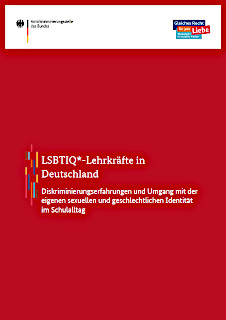LGBTIQ* teachers
in Germany
Experiences of discrimination and dealing with one’s own sexual and gender identity in everyday school life
- Factsheet on the research projekt -
Authors: Federal Anti-Discrimination Agency (FADA) Year of publication: 2017
Brief overview
The present study gives a comprehensive insight into experiences of discrimination of LGBTIQ* teachers and how they deal with their own sexual and gender identity at the workplace. The basis is an online survey with 835 LGBTIQ* teachers participating throughout Germany. The results are not representative but they give a good insight into the experiences of LGBTIQ* teachers at schools as places of employment.
The online survey was conducted by the Federal Anti-Discrimination Agency from 24th October to 4th December 2016.
Aim of the study
The study serves as an addition to the existing research concerning experiences of discrimination of LGBTIQ* students and is to make a contribution to closing the current gap in research on experiences of discrimination of LGBTIQ* teachers.
Main results
Experiences of discrimination in the school work environment
- Almost a third of all participating teachers had experienced discrimination on grounds of their LGBTIQ* identity within the 24 months prior to the survey. In particular, they experienced social degradation but also material disadvantages.
- The share of teachers with experiences of discrimination decreased significantly if they were informed about protection against discrimination through the General Act on Equal Treatment by their employer. The share also decreased if there was a complaints office for employees at the school, if the prevention of violence, bullying or discrimination was mentioned as an objective in the school regulations or the school's guiding principles and if sexual and gender diversity was addressed in the official curricula.
- Other teachers as well as students were indicated as perpetrators especially frequently.
- Of the teachers who said that they had experienced discrimination on grounds of their LGBTIQ* identity, 9 out of 10 reported that this had happened more than once.
How LGBTIQ* teachers deal with their own sexual and gender identity in everyday school life
- The people surveyed deal with their sexual or gender identity less openly in everyday school life than in their private lives; 4 out of 10 teachers deal with their LGBTIQ* identity openly at the workplace. Most frequently, it is other teachers that know about the LGBTIQ* identity of those surveyed.
- Fear of stigmatisation, fear of a loss of respect and of marginalisation and one’s own insecurity are the most frequent reasons which prevent teachers from speaking openly with regard to their LGBTIQ* identity.
Addressing sexual and gender diversity
- Half of the teachers surveyed stated that sexual and gender diversity was not addressed in the official curricula. Moreover, three quarters of those surveyed reported that it was up to each and every teacher whether and in what way to deal with this topic. This bears the risk of the topic not being addressed at all.
- If the topic of sexual and gender diversity is addressed, teachers deal with their identity openly a lot more often. At the same time, the share of teachers who report on discrimination on grounds of their LGBTIQ* identity decreases.
Options for action
There are targeted measures in order to eliminate discrimination against LGBTIQ* students and teachers and to promote a more open culture when dealing with one’s own sexual and gender identity:
- A compulsory incorporation of LGBTIQ* topics into school curricula
- Introduction of further compulsory trainings for teachers on the topics of sexual and gender diversity
- Addressing the topics as a cross-curricular theme in class
In principle, schools should consider drafting and implementing a comprehensive concept against discrimination. Key themes should be, inter alia, bans on discrimination as well as the precept of equality but also training courses and continuing education on social diversity and non-discrimination for teachers as well as information, counselling services and rights for students and parents.

